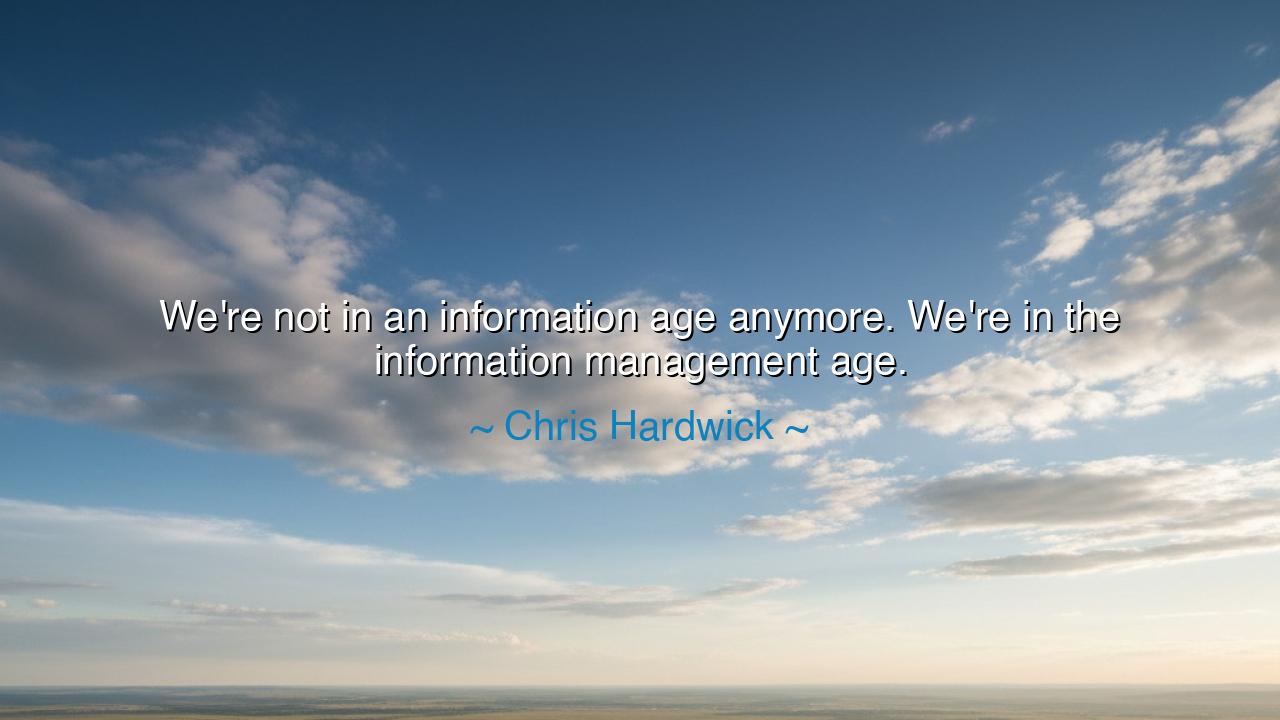
We're not in an information age anymore. We're in the information






"We're not in an information age anymore. We're in the information management age." These words spoken by Chris Hardwick capture the essence of the world we live in today, where information flows freely and abundantly, but the true challenge lies not in obtaining it, but in managing it. In an era where knowledge is at our fingertips, the ability to filter, organize, and apply information has become the most valuable skill. Hardwick’s reflection urges us to recognize the shifting landscape of the modern world, where quantity has outpaced quality, and the abundance of data has created a need for discernment and wisdom in how we engage with it.
In the ancient world, knowledge was a scarce and treasured resource. The Greeks had their great libraries, like the Library of Alexandria, where scholars labored to preserve and expand human understanding. In those days, the acquisition of knowledge was a monumental task—an endeavor that required vast effort, dedication, and time. Yet, even in such an age, there were those who understood the importance of managing knowledge. Plato, in his dialogues, explored not only the nature of knowledge but also how it should be used and applied for the betterment of society. His Republic is not merely a treatise on what we know, but on how we manage and apply knowledge for the common good. The challenge of information, then, is not new, but it has grown exponentially in the modern era.
Today, the information age has morphed into an era where overload is more common than enlightenment. In the ancient world, a single philosopher or teacher could guide a generation, but today, we face an unending torrent of ideas, facts, and opinions. Seneca, the Stoic philosopher, warned of the dangers of distraction—how the constant bombardment of stimuli can lead one away from purpose and self-reflection. In his letters, Seneca urged his followers to seek quality over quantity, to limit distractions and focus on what truly matters. In much the same way, Hardwick’s insight about the information management age calls us to step back and reflect on how we handle the vast amounts of information that surround us, urging us to seek mastery over the tools of our time rather than being dominated by them.
The information management age is about more than just consuming data; it is about curating and prioritizing what is truly valuable. This concept is reflected in the story of Leonardo da Vinci, whose notebooks were filled with a wide array of observations, sketches, and ideas. Yet, even Leonardo—one of the greatest minds of all time—understood that information alone was not enough. He didn’t just collect knowledge; he organized it, experimented with it, and applied it to create a legacy of art and science. In today’s world, the art of management is just as crucial as the art of learning. Da Vinci’s example reminds us that it is not the quantity of information that matters, but how we use and apply it to shape our world.
In more recent history, consider the case of Steve Jobs, who revolutionized the way we interact with information through the creation of Apple and its suite of technologies. Jobs understood that the real power of information was not just in making it available, but in organizing it in a way that was intuitive, useful, and impactful. The development of the iPhone was not merely the creation of a device, but a profound shift in how people could manage and interact with vast quantities of information. Much like the ancient philosophers who emphasized the importance of purposeful action, Jobs focused on how to shape information into tools that would enhance human potential, not overwhelm it.
The lesson in Hardwick’s statement is urgent and timeless: in an age where information is abundant, the true challenge is to manage it with wisdom and discernment. Quality must always come before quantity. In the same way the ancient philosophers, artists, and scientists carefully curated their knowledge, we must learn to filter the noise of the modern world and focus on what truly adds value to our lives. This is not about rejecting technology or progress, but about finding ways to use them for growth, clarity, and purpose.
In practical terms, this means that we must develop the skills to organize the information we encounter daily. Curating what we consume—whether through books, social media, or conversations—is essential to maintaining focus and balance. Just as Seneca advised the Stoics to practice self-control in the face of distractions, we too must practice discipline in how we interact with the flood of information around us. By learning to manage our information, we can move from a state of overload to one of empowerment, using the knowledge we gather to enrich our lives and shape our actions in meaningful ways.
Therefore, let us take Hardwick’s insight to heart and become masters of information management. In an age where knowledge is infinite, our wisdom lies in knowing how to navigate, curate, and apply that knowledge. By doing so, we can reclaim the power to shape our own paths in life, unburdened by the overwhelming noise of endless data. Let us embrace the challenge of managing information wisely, using it not as a distraction but as a tool for purpose, growth, and meaningful progress.






AAdministratorAdministrator
Welcome, honored guests. Please leave a comment, we will respond soon